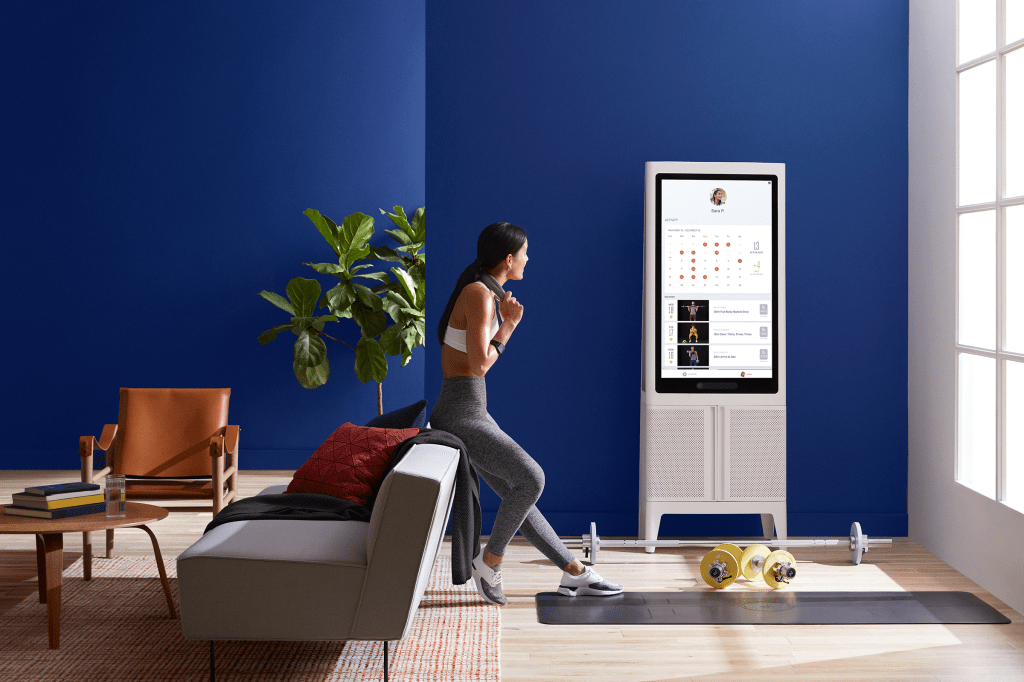When the pandemic forced everyone to stay at home last year, many gym-goers looked to at-home fitness makers to fill the void for their cardiovascular and strength-training workouts.
To help meet that demand, Tempo, the five-year-old fitness startup founded by Moawia Eldeeb and Josh Augustin, closed a $220 million Series C round led by SoftBank. The company plans to use the raise to shore up its supply chain, keep up with increased consumer demand and fuel efforts such as R&D and content. Other participants in the Series C round included Bling Capital, DCM, General Catalyst, Norwest Venture Partners and Steadfast Capital Ventures.
Tempo’s freestanding cabinet, which the company launched in February 2020, includes a 42-inch touchscreen with a 3D motion-tracking camera that consistently scans, tracks and coaches users as they work out.
It currently sells three hardware bundles, starting at $2,495, that include accessories like barbells, dumbbells, a folding bench, a kettlebell system, a squat rack, a workout mat, a recovery foam roller and a heart rate monitor, depending on which bundle customers spring for. Users also pay a $39 monthly subscription to access on-demand and live classes.
The concept for Tempo came about in 2015 when Eldeeb and Augustin developed SmartSpot, a computer vision-augmented smart screen they sold to gyms that helped trainers analyze and improve their clients’ form during workouts. With the trove of data generated and collected by SmartSpot, Eldeeb and Augustin developed a program that identified fitness users’ most common movement errors and utilized machine learning to offer unique recommendations for each individual user — a program that became part of the foundation for Tempo.
“Being a personal trainer once, I remember charging $150 an hour,” explains Eldeeb. “I want to create a better experience and offer it to many more people for a lot less. That means we’re going to continue to invest in the core technology that makes that possible.”
Tempo’s launch came during a particularly opportune time. With the pandemic unfolding, demand for at-home fitness solutions soared. The startup has seen sales surge 1,000% since it began taking pre-orders in early 2020, with delivery delays currently ranging between five to seven weeks — a common issue faced by other at-home fitness companies such as Peloton, Tonal and Echelon. Tempo users have collectively performed 5 million workouts, or clocked 40,000 hours on their devices to date, according to the company.
“That [supply chain] was definitely an issue,” acknowledges Eldeeb, pointing to production challenges posed by factories temporarily shutting down or reducing operations in 2020. “We were doing this for the first time at scale, and we’d made small quantities of the product before [launch]. But for our first year in the market, we had to solve all those problems and still ship the product, which was a huge undertaking. We basically had to reduce sales because I wanted the factory workers to be safe.”
For Tempo, the opportunity to scale is enormous, as the global market is estimated to reach $29.4 billion by 2025. With new funding in tow, Eldeeb wants to capitalize on surging demand, with plans of doubling down on logistics and its supply chain, growing employee headcount and expanding its content to offer yoga and boxing classes later this year.
With vaccinations across the U.S. steadily increasing and gyms reopening, the big question is whether people will stick with their at-home fitness workouts, throw themselves back into their old gym routines or adopt a hybrid model that marries the two. Eldeeb is betting that now that more people have acclimated to working out in their homes, they’ll stay the course out of sheer convenience, pointing to a Consumer Trends report from The New Consumer published earlier this year indicating that 81% of people under the age of 40 prefer to exercise at home.
If true, then companies like Tempo will continue to reap the benefits of this shift of fitness into the home.
https://techcrunch.com/2021/01/12/companies-rush-to-replace-the-gym-at-ces/



































Comment